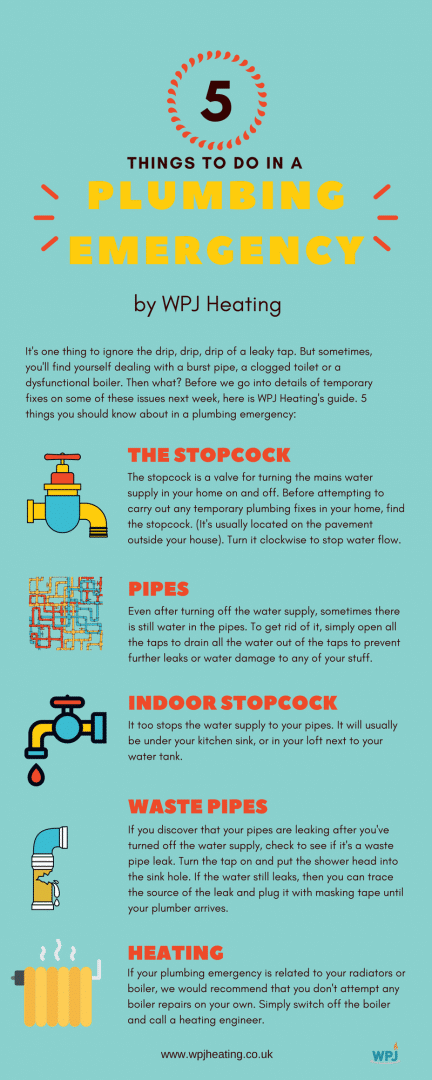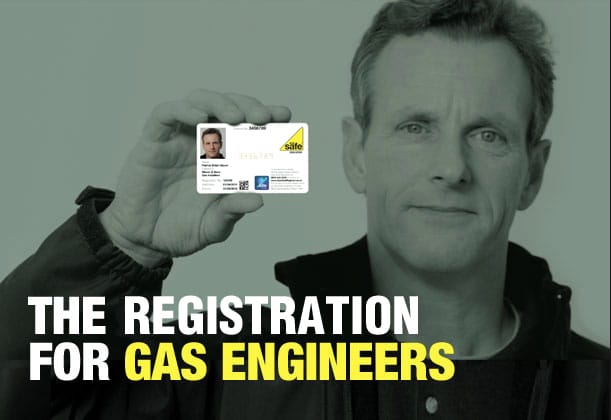Plumbing Emergency Basics
It’s one thing to ignore the drip, drip, drip of a leaky tap. But sometimes, you’ll find yourself dealing with a burst pipe, a clogged toilet or a dysfunctional boiler. Then what? Before we go into details of temporary fixes on some of these issues next week, here is WPJ Heating’s guide. 5 things you should know about in a plumbing emergency:
THE STOPCOCK
The stopcock is a valve for turning the mains water supply in your home on and off. Before attempting to carry out any temporary plumbing fixes in your home, find the stopcock. (It’s usually located on the pavement outside your house). Turn it clockwise to stop water flow.
PIPES
Even after turning off the water supply, sometimes there is still water in the pipes. To get rid of it, simply open all the taps to drain all the water out of the taps to prevent further leaks or water damage to any of your stuff.
INDOOR STOPCOCK
It too stops the water supply to your pipes. It will usually be under your kitchen sink, or in your loft next to your water tank.
WASTE PIPES
If you discover that your pipes are leaking even after you’ve turned off the water supply, it might be a waste pipe leak. In your bathroom, turn the tap on and put the shower head into the sink hole. If the water still leaks, you can trace the source of the leak and plug it with masking tape until your plumber arrives.
HEATING
If your plumbing emergency is related to your radiators or boiler, we would recommend that you don’t attempt any boiler repairs on your own. Simply switch off the boiler and call a heating engineer.
There you have it! 5 tips on things you can d during a plumbing emergency, before your plumber arrives. If you would like to speak to a plumber, or have any questions related to plumbing and heating issues in your home, give us a call on 0207 3502511.
Gas Safe Register is the official gas registration body for the United Kingdom, Isle of Man and Guernsey. It’s a legal requirement for all gas engineers to be on this register in order to work on boilers, cookers, fires and all other gas appliances.
Badly fitted and poorly serviced gas appliances can cause gas leaks, fires, explosions and carbon monoxide poisoning. According to research carried out by Gas Safe Register, 1.1 million gas jobs are carried out in the UK every year by illegal fitters who aren’t properly qualified, putting householders at risk.
Gas Safe Register has investigated almost 5,000 illegal gas jobs in recent years, finding that 3 out of 5 were in an unsafe condition. A worrying 1 in 5 were deemed to be so dangerous that the appliance had to be disconnected immediately. The research finds that 75% of victims had employed the tradesman based on a recommendation from a friend. In no cases did the householder check the fitter’s credentials, despite it being a legal requirement for an engineer to be on the register.
4 top tips from Gas Safe Register to stay safe:
- Only employ a legal Gas Safe registered engineer when having gas work carried out in your home.
- Every registered gas engineer carries an ID card. Always ask to see the card and check their unique licence number. The back of the card will also show which gas appliances they are qualified to work on.
- If you smell gas or think there might be a gas leak, call the free 24 hour national gas emergency number immediately on 0800 111 999.
- If you suspect that someone is an illegal fitter or are worried about gas work carried out in your home, contact Gas Safe Register.
Ask your engineer for their ID card and check the unique licence number at Gas Safe Register.




